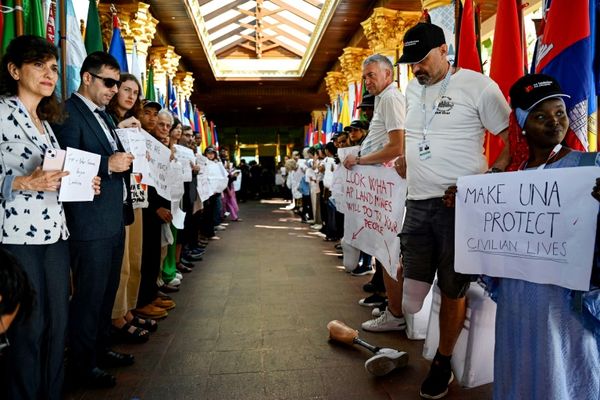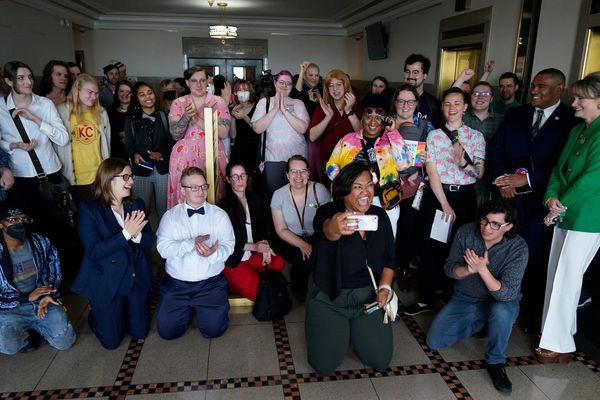ST. LOUIS, Mo. _ Anyone who knows anything about both college football and COVID-19 realized this season was going to get messy.
And now, officially, it is.
Messy because the thought of playing through the pandemic forced us to realize there was no good answer. It didn't really feel right to ask unpaid student athletes to play through a pandemic like professionals. But at the same time, it didn't really feel right to stop them if they wanted to, especially when a lost college football season after a lost March Madness would have resulted in lost programs, scholarships and jobs.
Messy because, logistically, the notion of football players and coaches not getting and giving a wildly contagious airborne virus to one another was as unrealistic as the assumption college students were not going to pass the virus around like a beer pong ball when campuses around the country repopulated. The virus doesn't care whether it crashes a fraternity party or a football practice. People seem to forget that.
Regardless, the chaotic landscape college football looks out upon this weekend is concerning. The Southeastern Conference, the predominant league in the sport and the one most dedicated to seeing through its season, finds itself in an undesirable position. It is squarely in the eye of the COVID storm.
The SEC enters Saturday with a game between Missouri and Vanderbilt postponed due to a COVID outbreak among Commodores; a game between Florida and LSU postponed due to a COVID outbreak among Gators; and the biggest game of the weekend and perhaps the season _ No. 3 Georgia at No. 2 Alabama _ overshadowed by the news that both legendary Crimson Tide coach Nick Saban and his athletics director, Greg Byrne, have tested positive for COVID.
Right about now would have been the perfect time for conferences that elected not to play this fall to stand up, clear their throats and announce at the SEC's expense that they were not the alarmists their critics claimed. The problem for those conferences, however, is that they caved and rolled out plans for a fall season. Plans that included no open weeks to reschedule games postponed for COVID-related reasons. Whoops.
The Big Ten and the Pac-12 can't look down at the SEC.
Not when they're just looking ahead at their future.
The same is true for college basketball, which just started official practices. If football is going to struggle to hold together a meaningful season during the pandemic, college basketball will, too. Sure, basketball is lighter on the physical contact, but it's heavier on the close contact, and smaller on the roster size. Some college basketball teams have an entire roster living beneath a total of three or four roofs. Practices and games are played beneath one. That's going to mean sidelined teams between positive tests and quarantines for close contacts.
The SEC's football slogan is, "It just means more." That's very true now. The football conference's recovery from this COVID stiff-arm, or lack thereof, will send ripples across the college sports landscape. There isn't a conference that will fight harder and dedicate more resources to moving forward than the SEC will to keep football on the field. If it tries and fails, what will work?
Another question: Is this working?
The postponements created by Florida and Vanderbilt pushed the number of COVID-related postponements in Football Bowl Subdivision games to 30-plus.
Saban, 68, was the sixth FBS head coach to test positive for the virus, becoming the most prominent (and oldest) name on a list that does not include any of the assistant coaches who have tested positive. Fortunately, Saban, like the other coaches, seems to be having a relatively mild interaction with the virus. Same for players who have encountered it. That doesn't mean all will. Those who claim to know the long-term effects the virus could have on players and coaches alike are not being truthful. Assuming that everyone who "gets over" the virus will not have complications from it is incorrect. One significant concern for athletes is how the virus can damage heart tissue. The more players and coaches who test positive, the higher the risk of disaster.
The Big Ten, Mountain West, MAC and Pac-12 have not yet started their seasons. Unlike the FBS conferences already underway, they did not include open weeks that can be used for rescheduled games. That likely turns out to be a big problem.
For every team taking the virus seriously, there is another taunting it, mistaking good luck for proof a season won't be slobberknockered by an outbreak. The latest example should enrage SEC commissioner Greg Sankey. Florida coach Dan Mullen was whining about his stadium not being able to hold as many fans as other venues while the Gators were on a road trip that included players who had not reported troubling symptoms. Maybe it was just bad optics. Maybe it was a good example of bad leadership.
Sankey and SEC athletics directors spent a lot of time this week reminding us the league was prepared for something like this. It's why the strict testing policies and postponement thresholds are in place. It's why programs that operated outside of the league's rules could be penalized through conference dollars withheld. It's why open weeks were baked into the league-only schedule. It's time to be the right combination of flexible, diligent and calm, all at once. It's time to find out if the SEC can get up and press on.
College sports during the pandemic was always going to be messy. But if it gets so messy the SEC can't help but punt, that's big in a bad way. It just means more, indeed.







